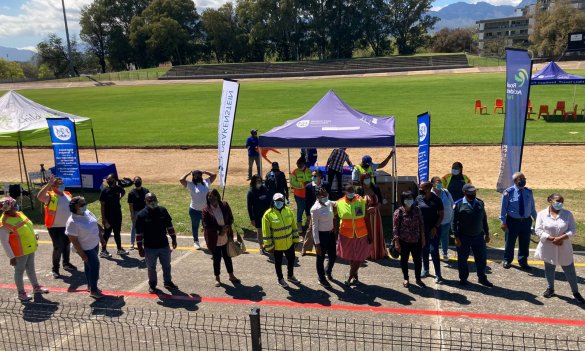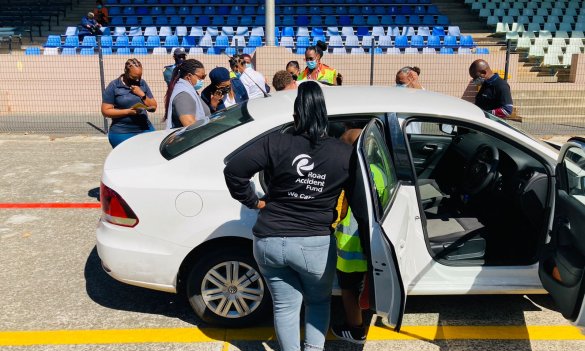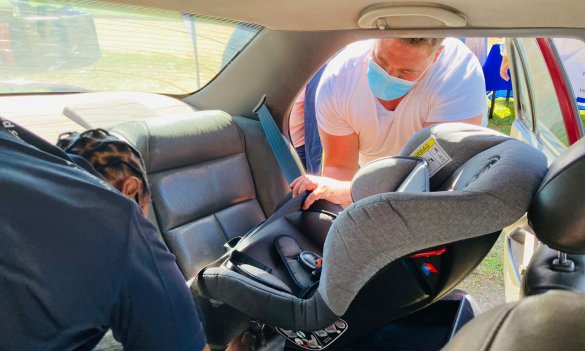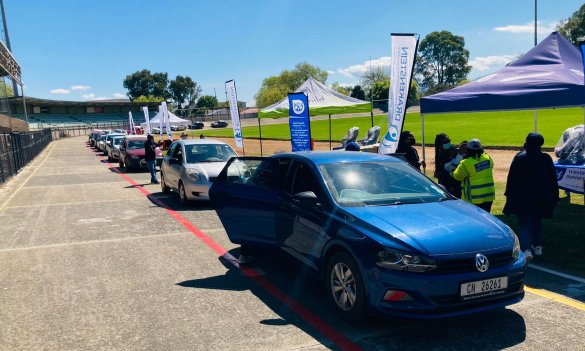On 28 September 2021, the Directorate: Road Safety Management of the Western Cape Department of Transport and Public Works (DTPW), the Road Accident Fund (RAF), and Childsafe, a non-governmental organisation based at Red Cross Memorial Hospital that specialises in child injury prevention, handed out and fitted 40 child restraints (commonly known as car seats) to motorists in Paarl, Mbekweni, Newton and Wellington.
A properly installed child restraint could save your child’s life and prevent serious and life-threatening injuries. The restraints, which are suitable for children up to the age of two years, were donated by the RAF. The event was part of September Seatbelt Month and #AlwaysBuckleup.
Under the National Road Traffic Act, children in a car must be strapped into an age-appropriate harness. Children are particularly vulnerable road users in South Africa. Road crashes are the leading cause of death for children aged 5-14 years. Two road-user groups – child pedestrians and child passengers – are particularly vulnerable, making up 62 and 36 percent of road fatalities respectively.
Observational studies conducted by Childsafe found that a large number of children arriving at the Red Cross Memorial Hospital by car were not in a child restraint. Childsafe says properly fitted child restraints can reduce the likelihood of child road traffic fatalities by between 54 and 80 percent.
The organisation says current legislation provides no indication as to the best position for a child under the age of three in a child restraint. In the event of a crash, an airbag is a serious hazard for a child in a forward-facing child restraint in the front seat of a car. Best practice law in certain other jurisdictions provides that, up to the age of 12, children of certain height and weight must be in a child restraint. Children up to the age of 12 who exceed these height and weight limits, and those over the age of 12, must wear a seatbelt.
Childsafe is worried that traffic police do not always enforce the law on child restraints. It says there is a need to improve the training of enforcement officers so that they are better able to estimate the age of a child, and so that they are better able to check whether a child restraint is correctly installed. The organisation is calling for the fine for not using a child restraint when transporting a child to be made much more severe than the current amount of R250. In the UK, the maximum fine for not being restrained anywhere in a car is £500 (about R10 200).
DTPW road safety officer Christal Nyman says the Department conducted a focus group interview with parents about their use of child restraints in 2019/2020. Some participants reported ensuring their children were buckled up, others did not. A similar lack of consistent compliance with the law was reported about parents’ use of child seats usage for younger children, although the majority reported not using child seats even if they owned them. Beliefs about whether children were safer when using the child seat or in an adult’s lap were mixed.
Nyman says some parents allowed their children to sit in the front seat if they wore a seatbelt, while others forbade their children from sitting in the front seat because they believed the risks were higher.
The reasons provided for failing to restrain children with seatbelts or child seats were as follows:
- Not being the owner of a car in which a child seat could be installed.
- The belief that the child was safer in the mother’s lap.
- The expense of a child seat.
- The fear of vehicle being hijacked with the child strapped into the child seat.
- The inconvenience of installing and removing the car seat repeatedly to transport adult passengers.
- Overloading or the lack of seatbelts in minibus taxis.
An important factor was that many families do not own a car. Carrying a child seat around for public or hired transport would not be possible for these families. One young male professional driver explicitly stated: “[For a client] to put that seat, I will never give her a lift… You see because the process is also put that thing and clip it. She will have to carry the baby. That’s how we roll in the township.”
“A child restraint can be a case of life and death. If a parent is willing to spend a fortune on a car, there should be nothing preventing him or her from spending a bit extra to make sure those they love the most are safe,” Nyman said.




